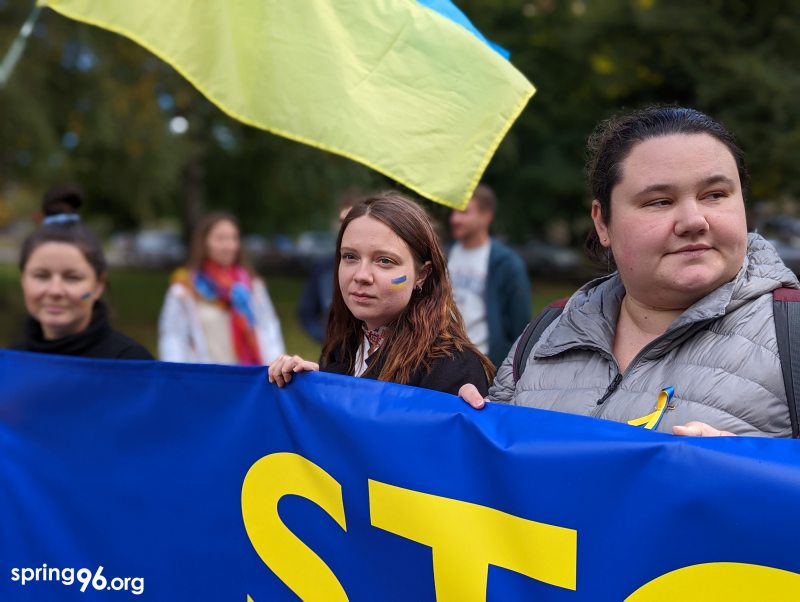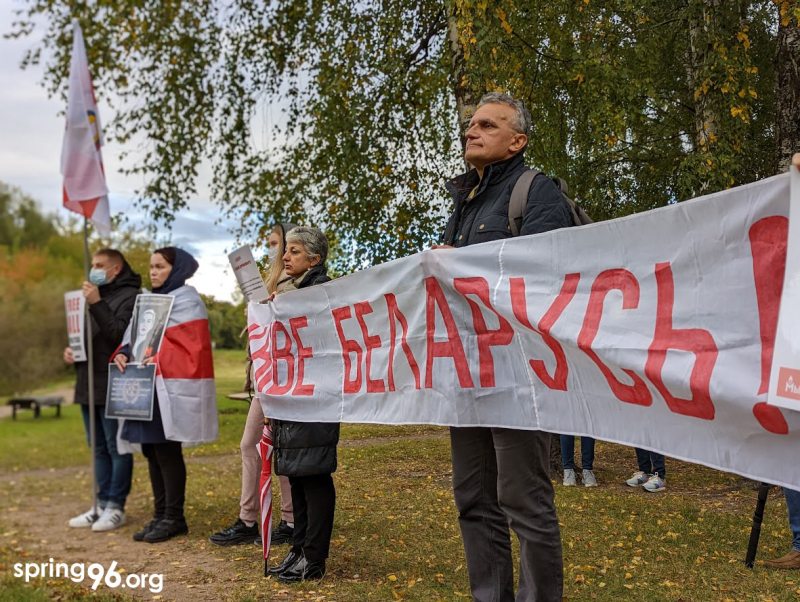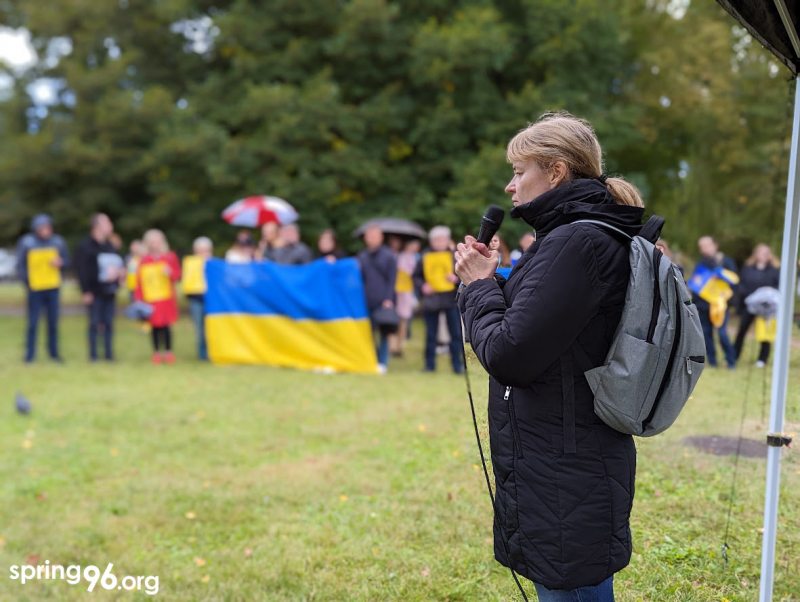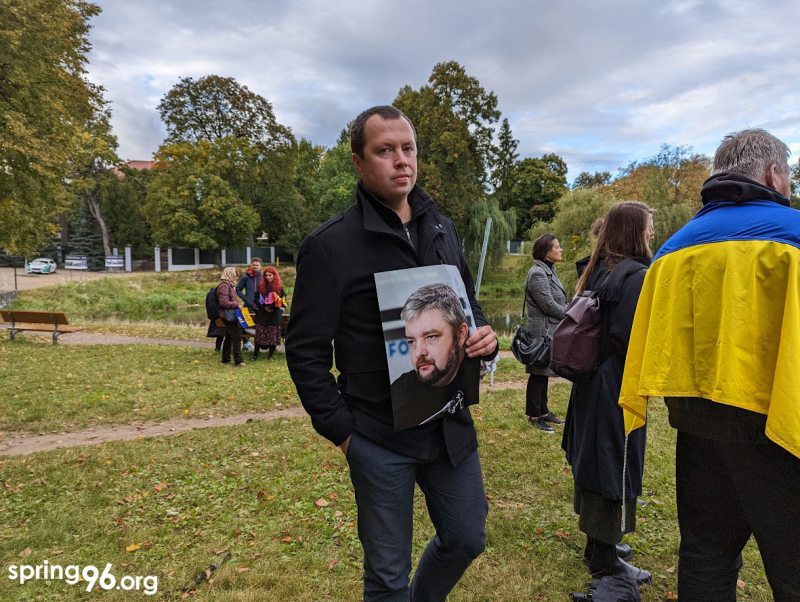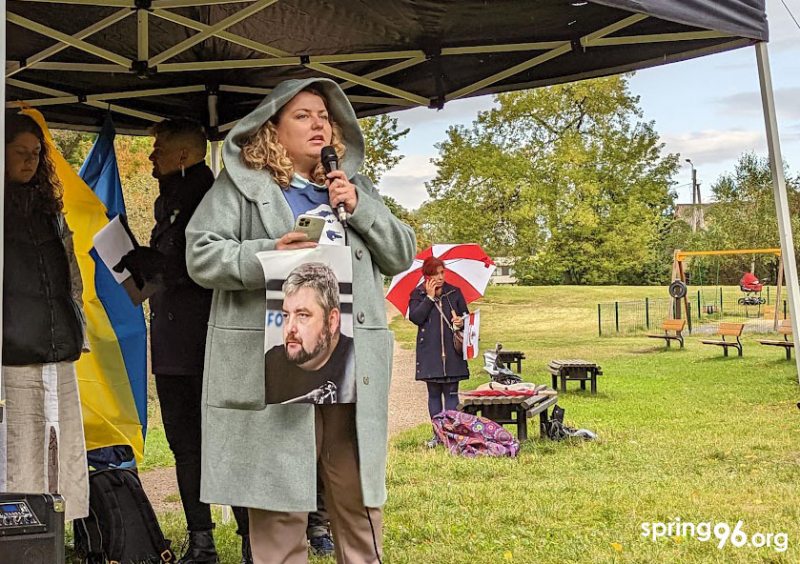"This is a common European challenge." Belarusian human rights activists stand in solidarity with Ukraine Photo
Human rights defenders from different countries held a solidarity action with Ukraine near the Russian Embassy in Vilnius on September 21, the International Day of Peace.
Belarusian human rights activists who used to live in Ukraine and were confronted with the war also took part in the protest. What did they talk about?
Siarhei Sys, a poet and Viasna representative, lived in Chernihiv before the Russian invasion began:
"In 2020, we wanted to be free and happy like Ukrainians. It didn't work out. The repressions began: thousands got to prisons, and hundreds of thousands fled the country. I had to leave the country, too.
Ukraine had become my second home. I was welcomed and helped by the human rights defenders: Chernihiv Human Rights House and Vostok SOS charitable organization, among others. The people of Chernihiv, where I lived for seven months before the war, became my family.
Belarusians shouldn't be above this battle, the more so that Lukashenka's regime provides its territory for attacks on free Ukraine."
Maria Tarasenka, a human rights activist and Viasna volunteer, also fled from repression by the Belarusian authorities to Chernihiv. After February 24, she was forced to flee from the war.
"In Belarus, I fought for my own and other people's rights. When the sad developments of 2020 hit us, I helped many people, and the authorities persecuted me for that. I had to leave my native Homieĺ region and move to Ukraine. I am very grateful to the many people who supported me.
The most painful was February 24, when the Russian hordes went to Ukraine.
I was in the war zone near Chernihiv, I saw shelling, I saw houses burning, I saw people hiding in basements — and I shared their hard life. It's a great challenge.
I hope Ukraine and Belarus will pass this test and become better and stronger. They should show the world that violence never solves anything, peace and creation only can do that."
Barys Haretski, deputy chairman of the Belarusian Association of Journalists, lived in Kyiv before the war:
"I don't regret for a minute that I chose Kyiv and Ukraine as a place to live. Exactly one year ago, my colleague Maksym Butkevich and I flew to Berlin to discuss the issue of Belarusians who had to flee their country: ways to create opportunities, programs, and services for them, to make them feel worthy. Last winter my colleagues from Vostok SOS and I were planning a trip of our journalist colleagues to Severodonetsk, where the organization's head office is located. Alas, Maksim Butkevich is in captivity, and the Severodonetsk office is inaccessible.
But I have great pride for us Belarusians who support Ukraine and for the entire European continent. After all, it is obvious that the war in Ukraine is not a war against an individual state. It is our common European challenge. Can we withstand this kind of attack on human rights, freedom, independence, and life? Ukrainians are simply at the forefront of our lives."
His colleague Liudmila Yankina also mentioned Maksym Butkevich, Ukrainian human rights activist and member of the ZMINA Center for Human Rights board.
"For a long time, Maksym has been involved in the protection of refugees and those who sought asylum in Ukraine fleeing their authoritarian countries. Over 100,000 Belarusians came to Ukraine. Maksym fought to protect their rights. On 24 February 2022, he joined the Armed Forces of Ukraine to defend his country. He was captured some months later.
We are unaware of where he is being held and what his condition is. But we know for sure that Maksym will withstand this ordeal with dignity. I urge the Russian Federation to return Maksym Butkevich to Ukraine, following the norms of international law and customs of war."
The action near the Russian embassy in Vilnius was organized by the Human Rights House Foundation and the Barys Zvozskau Belarusian Human Rights House. Human Rights Houses from Chernihiv, Crimea, and Yerevan, as well as ZMINA Human Rights Center took part in it. The Belarusian side was represented by the Viasna Human Rights Center, Belarusian Helsinki Committee, Legal Initiative, and others.
By Resolution 3667 in 1981, the UN General Assembly proclaimed the Day of Peace and established its celebration on the third Tuesday of September. 20 years later, in 2001, the UN General Assembly adopted Resolution 55282, which established September 21st as an annual day of violence and cease-fire.



